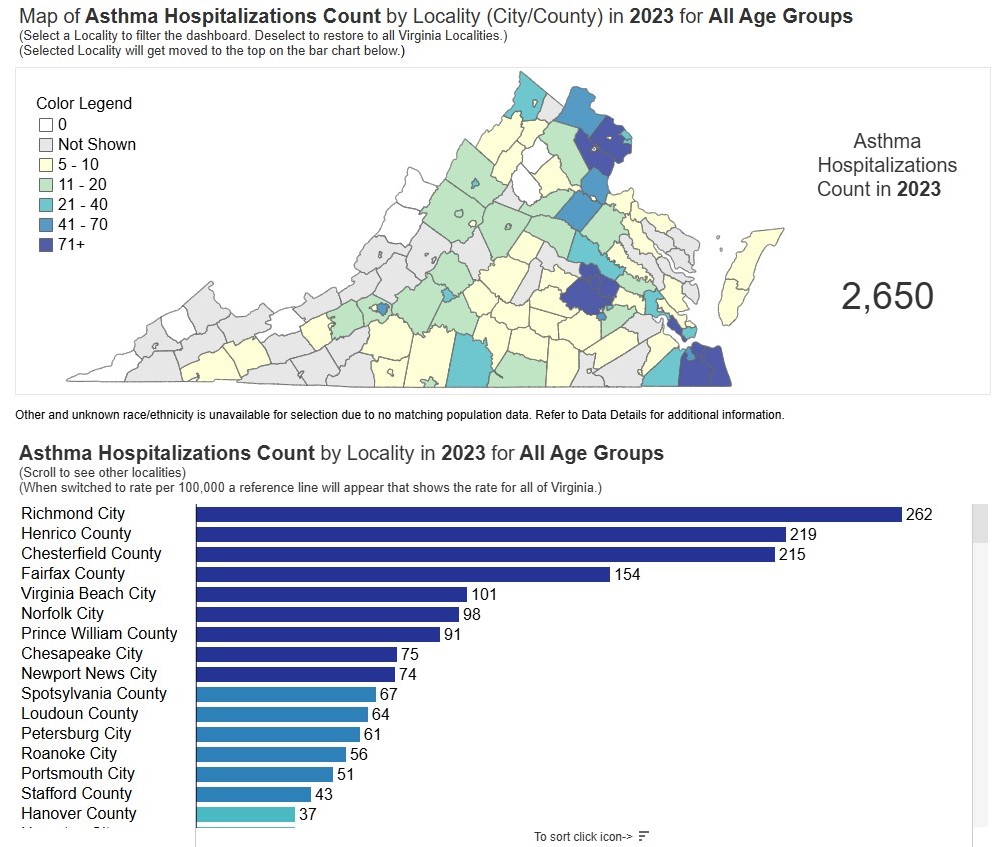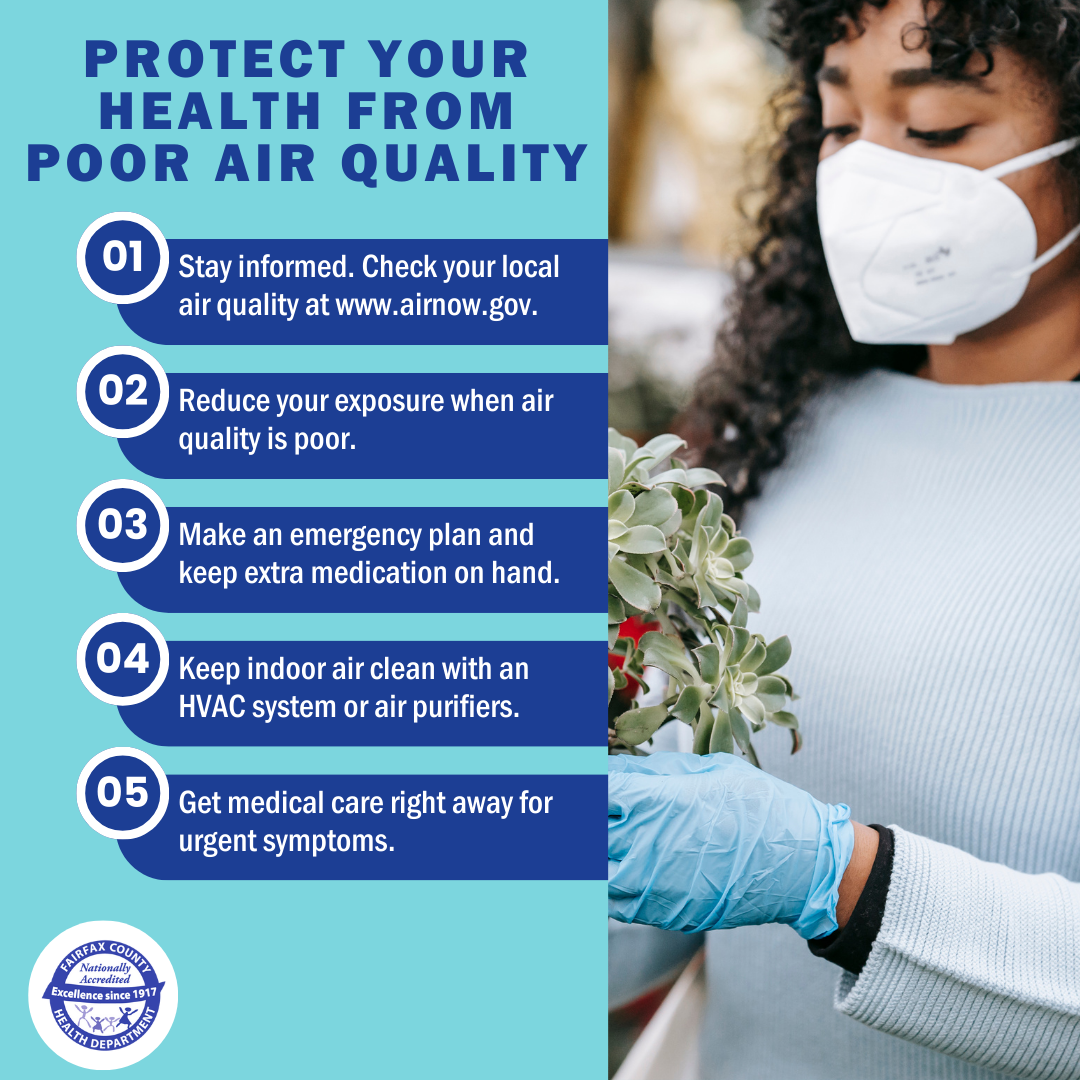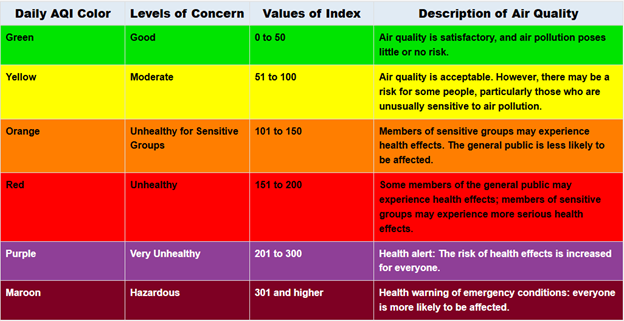Written by Liza Sabine, Preparedness Coordinator, Fairfax Couty Health Department
Fairfax County is experiencing warmer, wetter, and weirder conditions due to climate change. This means our communities are facing longer and more intense pollen seasons, more pollution in the air, and wildfire smoke from faraway places. These changes can worsen air quality and affect our health.
As we observe National Air Quality Awareness Week (May 5-9, 2025), take a few minutes to learn how to protect your health and the health of your loved ones from the impacts of poor air quality.
How Does Air Quality Affect Health?
Poor air quality can cause:
- More severe or frequent allergy symptoms, such as red or itchy eyes, runny nose, scratchy throat, and sneezing
- Worse or more frequent asthma attacks
- Worsening of respiratory illness, heart disease, and other medical conditions
- Higher risk of new health issues, like heart attacks, asthma, and allergies
Who is at Risk?
Everyone can be affected by poor air quality, but some groups are more at risk than others.

- Children, infants, pregnant individuals, and older adults, because they can be more affected by things like pollen, air pollution, and heat.
- People with medical conditions, such as heart disease, lung disease, or asthma, because poor air quality can worsen existing symptoms and increase strain on the body.
- Outdoor workers, first responders, and student athletes, because they spend more time outside performing strenuous activity.
- People of color, due to higher rates of asthma, chronic obstructive pulmonary disease (COPD), and heart disease, and higher chance of living in areas with heavy pollution. Asthma hospitalizations in Fairfax County have gone up in recent years, with Black, non-Hispanic residents experiencing the highest rates. See data by county and race/ethnicity in the Asthma Hospitalizations Dashboard (Virginia Department of Health).
- Low-income individuals, because they are more likely to live in older buildings with cracks in foundation and drafty windows and doors, which can let pollutants in. Low-income communities also typically have lower access to affordable healthcare and transportation and are often located in areas with more pollution.
- Unhoused individuals, due to amount of time spent outside and often poor access to affordable healthcare.
How Can You Protect Your Health?
Protect your health and safety from poor air quality by taking the following actions:
- Stay informed:
- Check your local air quality at www.airnow.gov and learn what the different colors mean.
- Keep an eye on local pollen forecasts using a weather app or website.
- Sign up for emergency alerts with Fairfax Alerts.
- Reduce your exposure when air quality is poor:
- Stay inside as much as possible and keep windows and doors closed.

- Choose shorter or less intense outdoor activities. Take more breaks when outside.
- If you need to go outside, wash your hands, take a shower, and change your clothes when you get home to remove pollen and other substances from your hair, skin, and clothing.
- Stay inside as much as possible and keep windows and doors closed.
- Make an emergency plan:
- If you have asthma, allergies, or lung disease such as COPD, keep extra medication on hand for emergencies.
- If you use an inhaler, consider asking your doctor for an extra one as a backup.
- Learn what makes your symptoms worse and avoid those as much as possible.
- Keep a list of medications, dosages, allergies, and medical conditions for each member of your household.
- Learn more emergency preparedness tips at fairfaxcounty.gov/health/emergency.
- Protect your home to keep indoor air clean:
- If your home has an HVAC system, use high-efficiency filters and change them frequently.
- If you don’t have an HVAC system, consider portable air purifiers or box fans.
- Use caulk to seal any cracks around windows and doors.
- Seek medical care:
- Talk to your doctor about medications and treatment for your health conditions so you can be prepared year-round.
- Get medical care right away for urgent symptoms such as shortness of breath, chest tightness, or heart palpitations.

Take proactive steps to safeguard your health and the well-being of your loved ones by staying informed, reducing exposure, and preparing for emergencies.
Learn more and stay updated throughout the summer months using the resources below!
More Resources
- Resilient Fairfax, the county's climate resilience and adaptation plan
- Climate Change Impacts on Air Quality (EPA)
- AirNow.gov

Liza Sabine is a Preparedness Coordinator for the Fairfax County Health Department’s (FCHD) Division of Emergency Preparedness & Response (EP&R). In her role, she manages the Climate Health Program and other projects to help Fairfax County residents prepare for, respond to, and recover from emergencies. Liza previously worked as a program manager at the federal level for 12 years and has served as a disaster response volunteer for the past 10 years.
Climate Matters is the blog of Fairfax County’s Office of Environmental and Energy Coordination, where we share stories, insights and information related to climate change and environmental sustainability. Posts are written by knowledgeable and passionate OEEC staff members and guest authors. To read all blog posts, visit Climate Matters.

